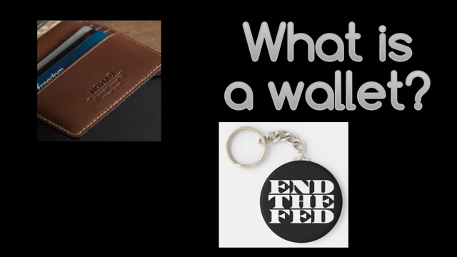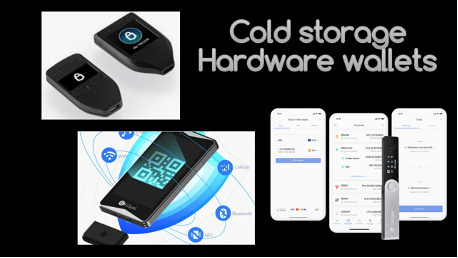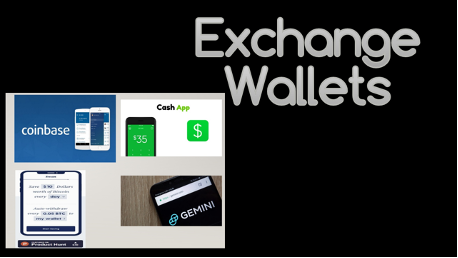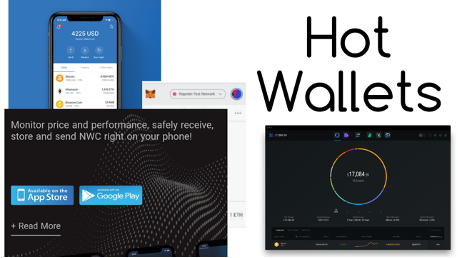This past week, I attended 4 major cryptocurrency events in Miami and Orlando and also many smaller evening events and parties, all in the name of Cryptocurrency.
Over 50,000 people were estimated to have traveled to South Florida for these events. Awareness and adoption, while no where near mainstream, is growing constantly. Many new and eager people are thirsty for knowledge so be sure to share all the educational tools that Newscrypto has to offer. At the Florida Blockchain Summit in Orlando, I spoke from stage, representing Newscrypto, about wallets and the pros and cons of each type, and basic wallet security.

I've included pictures of my slides from my presentation. So many new people ask their first question about which wallet should they get. Because of that, I felt it was important to post this blog from last year that we published about wallets. If you've read it already, take a refresher and look over it again and/or share it with someone new.
People have used many different methods to store their money and other items of value. Recently someone was arrested for carrying gold bars in his rectum...Ouch. Storing your cryptocurrency is definitely way less painful that what that guy had to do, and many may be using the wrong type of wallet based on their needs. Recently we looked at proper security in a past How-to Crypto Report so if you haven’t read that one, you will want to visit it after reading this one.
A cryptocurrency wallet by name can be very misleading. We use terms many times that are relevant to older technology just so that people will be able to understand more easily. Wallet is definitely one of those terms. Just like many will say to roll down a car window, when most vehicles now don’t even have the manual handle any more that was used in older cars to roll to lower the window.

A cryptocurrency wallet actually stores no cryptocurrency. So, do not freak out when you learn that there is zero cryptocurrency actually in your cryptocurrency wallets. The cryptocurrency is still where it belongs. In a ledger on the blockchain of choice. The wallet is actually more like a keychain. Your wallet holds the “keys” to access and control your cryptocurrency. However, it seems the term adopted of wallet makes it easier for people to understand when talking about sending or receiving cryptocurrency to their wallet rather than the fact that they are actually only receiving the keys to access it and storing it on a “keychain.”
So now let’s dig in and look at the different types of wallets to determine which type of wallet or wallets is best for you.
Before we discuss wallets, it is best to understand that all wallets fall into two major categories, hot wallets and cold wallets. Easiest way to separate the two is to know that hot wallets are connected to the internet and cold wallets are not. The benefit of hot wallets is they are readily accessible for trading, payments, or any other online function using the sending or receiving of cryptocurrency. However, in terms of security, hot wallets are more susceptible to hacking since they are connected to the internet. Cold wallets make funds not as easily accessible, but this can be a benefit unless you need to access the cryptocurrency for daily use.
Some manufacturers of cold hardware wallets have tried to bridge this divide with the ability to easily connect cold wallets to mobile devices or computers when needed. Cold wallets can be considered more secure because they are not connected to the internet.

The first wallet most people are exposed to are wallets within centralized cryptocurrency exchanges. Many will buy on Kucoin, Binance, or Coinbase, or several other exchanges that offer people a fiat gateway, which means a gateway to use their fiat currency in a bank account or credit card to purchase cryptocurrency on these exchanges. Exchange wallets can make it easy for anyone to buy and sell cryptocurrency, but the main thing it lacks is ownership and control by you. Some trade the ease of getting in for true ownership. Some have even made it easier with phone apps similar to Coinbase and Crypto.com apps that allow users to purchase with a few swipes of the finger.

The exchange holds the private keys, therefore, if they are hacked or shut down, many times people have no recourse to claim the cryptocurrency that they held in their accounts. This brings up a popular saying in relation to cryptocurrency which is, “not your keys, not your crypto.” This means you actually don’t own the cryptocurrency and don’t actually have custody of the cryptocurrency even though it may show a balance in your account. You are trying to hold a decentralized asset on a centralized exchange.
The recommendation is don’t hold any cryptocurrency on exchanges unless you are actively trading it. The only benefit to this type of wallet where someone else holds the keys to the cryptocurrency is if you are lazy with your security. Meaning, if you forget your password on your account with a centralized cryptocurrency exchange, you can usually take steps for them to reset your password and give you access again. In cases of wallets listed below this, you have complete ownership and control, which means responsibility as well. If you forget your password, you will need to provide the backup seed phrase or private key to restore the wallet. No customer service rep can do that for you with the wallets listed below. They provide true ownership, which again, means true responsibility of how secure your wallets remain are solely on you.
The next type of wallets we’ll look at have some overlap so we group them together. These are web wallets and mobile wallets. Web wallets usually require you to enter a website address or access a downloaded browser plugin to access the wallet. When using these wallets, it is best to identify if it is a wallet that allows you to access your private keys, backup seed phrases, or secret phrases. Centralized wallets do not give you that true control and ownership and create a centralized point where hackers usually point their attention, similar to exchange wallets.
Web wallet examples are Blockchain.com, Metamask, and MyEtherWallet. Mobile wallets operate similarly, except that instead of visiting a web address, you download and access a mobile app on your cell phone or other device. You still need to make sure the mobile app allows you to control and manage your private keys. Examples of mobile wallets that allow you to control this are NWC wallet, Exodus, Trust, and Solar Wallet. Examples of wallets that do not give you true control and the private keys are held by a centralized entity are crypto.com wallet and CoinZoom. It is not recommended to leave cryptocurrency on these types of wallets unless you are actively buying, selling, trading, or, in case of crypto.com, using cryptocurrency for purchases. The mobile wallets that allow you to manage your private keys can sometimes be the best mixture of security and portability, as it allows you to access it on the go, and most people have their mobile devices with them at all times. The biggest drawback to these depends on your security practices. You can learn more about that in our How-to Crypto report on Security.
Desktop wallets can be similar to mobile wallets, and there is overlap between the two in many cases. In the case of desktop wallets, a program is downloaded to your computer that allows you to use the desktop wallet program. Some examples are Exodus, Solar, and Atomic wallets. The three examples mentioned also give you the option of syncing your desktop wallet with a mobile wallet.
This allows you two points of management of your cryptocurrency, both at home on a desktop computer, or on the go with your mobile device or a laptop. Anytime you are using these types of mobile or desktop wallets, it is crucial that you write down and store your seed phrases or secret phrases in a secure location. If you lose your device or your computer crashes, you can easily restore the wallet on another device if you have this info. If you do not, there is no one you can contact to help you with this. The security of desktop, and even mobile wallets really depends on the security practices of the user.
Everything mentioned so far is considered a hot wallet. Next we will look at examples of cold wallets. The most widely used cold wallets are hardware wallets. A physical device designed to store your private key access to your cryptocurrency. The only time it is connected to the internet is when they are plugged into a device or connected through bluetooth. This is considered one of the most secure ways to store your cryptocurrency.
 Ï
Ï
The private keys never leave the hardware wallet protecting them from malware and hackers, and the user approves transactions on the device itself. The two most popular types of hardware wallets are the Nano Ledger series and Trezor. The Nano Ledger S and all Trezor models allow you to connect hardware device to your computer to access your cryptocurrency. The Nano Ledger X allows you to connect wirelessly through bluetooth to your mobile device or computer.
Anytime someone has a substantial value in their cryptocurrency holdings, it is best to move a majority to a cold storage hardware wallet if they are not actively trading it. Hardware wallets also provide you with a backup seed phrase that must be written down and stored in a secure location. This will allow you to restore access if you lose the device. Usually there is a blank card provided by the hardware wallet company.
These hardware wallets range in price from $50 to $130. We have seen some new brands emerge recently that cost more and look more like a mobile phone, but make sure you can find solid reviews and security audits on these devices before purchasing. Also, always purchase these directly from the company. There have been numerous reports of people purchasing from third parties and they receive fake or compromised devices. It is not worth saving a few dollars, only to get your cryptocurrency stolen by using a fake or compromised device.
The last type of wallet we will discuss is the most basic of them all, a paper wallet. It is just what it sounds like. A sheet of paper, either written or printed that contains your private keys. Some will include a QR code to make it easier to access or move to or from a device.
Anyone with access to this paper wallet can have access to your cryptocurrency. While it is safe from hackers, it is not safe if someone were to gain access to it. Also, if you have a catastrophe happen, such as flood or fire, paper can easily be destroyed. If you don’t have a secondary copy somewhere else, you could lose access to your cryptocurrency. Also, over time paper itself can deteriorate depending on how it is stored, which can make a paper wallet illegible. Even though not made of paper, there have been reports of some people taking additional steps and stamping their paper wallet info onto a metal card or sheet to prevent damage or deterioration. Walletgenerator.net is an example of a paper wallet provider. Also, if you ever purchase cryptocurrency from a Bitcoin ATM, most give you the option if you want to print out a paper wallet for your purchase. There are even plastic and metal card wallets that provide the security of a paper wallet but are a little more durable to the elements.
Each wallet type listed above has pros and cons of each, usually in relation to either security or ease of access and use. A philosophy that I share with students all the time is to compare your crypto wallets to how you would normally store physical money. Usually if it is a small amount, less than a few hundred dollars worth, being in a hot wallet, such as a mobile or web wallet is fine if you plan to be accessing that crypto to buy, sell, trade, or spend. Larger sums that you don’t need access to daily should be kept in more secure places such as cold wallets. A cold wallet is similar to a safe or vault. A safe or vault is where someone will lock up their most treasured valuables. Similarly, large sums of cryptocurrency that you are not actively trading should be stored in a cold wallet, just like money or valuables in a vault.
Regardless of which wallet your choice, if you share or expose your seed phrase, private keys, or secret phrase, you are at risk of having your cryptocurrency stolen. You must protect this information to the best of your ability. Do not store backup info in the notepad on your phone or computer, or in your email. In 2017, someone I know lost 10 BTC from an Exodus wallet and it was not the fault of the wallet. This person stored their backup seed phrase in their Gmail email account. The wallet was not compromised, but their email was hacked. Cryptocurrency can give you back the freedom to store and transact without the need for a third party to approve your transactions.
Cryptocurrency cannot have your funds frozen by banks or governments like they can with normal bank or security accounts. Sure, this usually is done when someone is involved in a crime or criminal activity, but what happens when those that are criminals or immoral are the ones in power? You can look to several countries where we have seen what happens when this power is overly abused. So whether you trust your government or financial institutions or not, cryptocurrency puts you back in control. These types of wallets also will ensure that billions of people who have zero or little access to financial institutions will be able to interact in this new digital economy. Now that you have control, make sure to choose the right wallet for your cryptocurrency needs.
Content written by Blockchain Wayne and NewsCrypto Team




